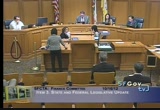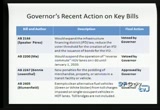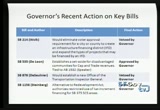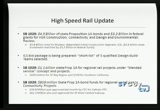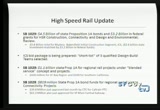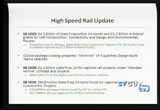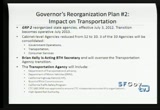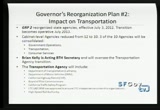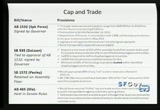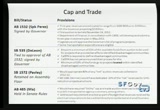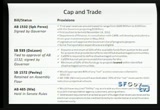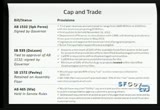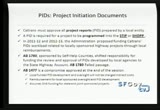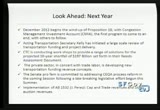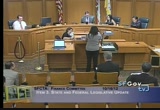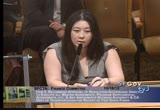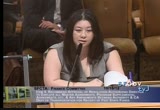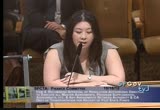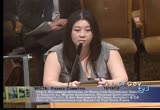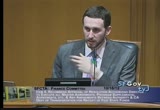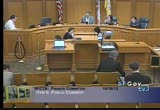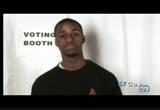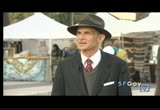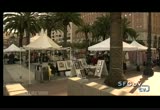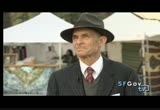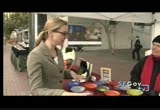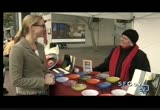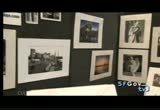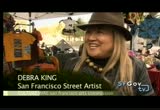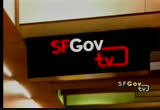tv [untitled] October 21, 2012 11:30pm-12:00am PDT
11:30 pm
>> hello members. >> i can just move it. >> you are all set. >> we will relocate because we have the laptop and can move through it. we will do a little different of a presentation we have normally done with the matrix. we have put a powerpoint presentation together. this will give us the opportunity to go through a couple bills. how we were watching this and looking ahead as to next year, what will be coming down the turnpike. wanted to highlight a couple bills we were watching. ab819, which would require caltrans to establish procedures for non-standardized designs for bicycle projects. this was approved by the governor. another bill of interest would be ab1532, the speaker's bill, which would
11:31 pm
set procedures for use and distribution and cap and trade funds. i will go into this further. i think this would be of great interest to the board of supervisors with respect to the designation of the funds and the revenues that will be generated from the cap and trade program. next is ab2144, which is another bill sponsored by the speaker assembly member perez. this bill would expand the isd law and reduce the voter threshold for creation of an ifd and issuance of bonds for the ifd. unfortunately this was vetoed by the go for. there is discussion about it coming back next year. another bill of interest is sb214. this was vetoed by the governor and would have eliminated voter approval requirement for the city or
11:32 pm
county to creative ifd and expand projects. >> did the governor give reasoning why he showing hostility for ifds? >> no. >> redevelopment reaction or -- >> correct. there is a little bit of continued redevelopment drama. another is 878. again vetoed by the governor. this would have established the office of transportation, inspector general. second to last is sb1339. this bill was approve bid the governor. it is a new pilot program for san francisco bay area that allows mtc and the bay area quality management district to jointly adopt an ordinance requiring covered employees to offer
11:33 pm
commute benefits. another bill that was of interest to the board is sb1492 by senator leno which permits sf to back fill up to 2% of vls, requiring two-thirds vote by the board of supervisors and majority vote by the people. this was approved by the governor. hats off to senator leno. this was carried last year, didn't see the light of day. he was able to get it signed. next i want to touch on high-speed rail and give you an update as to what is occurring. fb1029 was passed, which provides $8 billion from state and federal appropriation authority. 4.5 billion of proposition 1a bonds and 3.2 billion in federal grants for high
11:34 pm
speed rail construction. 5.8 billion of that goes to the madeira bakersfield construction segment. the money is moving out. there is a short list of five qualified design build teams that have been selected and will be submitting some documents for the procurement of the contract. the only issue that may slow down the development is couple of the environmental lawsuits down in the central valley. so we will be waiting on the outcome of those lawsuits. sb1029 also set aside 1.1 billion from prop 1a from regional rail under the blended service. the money was divided between san francisco bay area, which will receive $600 million and $500 million for southern california. as you know, the blended service, it would be used for the purpose of building
11:35 pm
compatible systems for higher speed rail until they were able to get money for the actual high speed rail in those two areas. additionally 1029 created 8.-- sorry, $819 million of prop 1a bond funds for regional and caltrans connectivity projects. $39 million approved by ctc for caltrain and $61 million approved for san francisco muni central subway. this money is moving out of the cdc. they are trying to get that out to everybody. next discussion would be the governor's reorganization plan. we are calling this the governor's reorganization plan part 2. as you know in january the governor launched a reorg plan which introduced how he wanted to reorg some of
11:36 pm
the agencies. it became effective july 3rd this year. and will become operative in july next year. what will occur, or what has occurred and will continue to is 12 agencies have been reduced to ten agencies. three of those ten agencies have been consolidated with some of the departments being moved into agencies and out of agencies. those three that have been adjusted and consolidated are government options, transportation and consumer services. as you know, brian kelly has been appointed the acting secretary for btnh which will ultimately become the transportation agency. he will oversee that transition. they are waiting both
11:37 pm
transition and also by holding off on the appointment. it buys the governor time in getting him reconfirmed or getting him confirmed in front of the senate. so they wanted to wait until after the election and the transition. within the transportation agency, the departments that will go under the agency will be caltrans, dmv, chp, board of pilot commissioners, california traffic safety program, ctc and also the high-speed rail authority. there was some concern about ctc coming under the agency. that was because of the independence the ctc has. as a commission. that was resolved under ab1458, which allowed the ctc to come under the agency will at the same time, rain training its independence. the next slide we wanted to
11:38 pm
focus a little on cap and trade and some of the developments coming from this last year. ab5032, the speaker's bill, dealt with the first year revenue that were going to come out of cap and trade program. they will see the first auction november 14th. there is an estimated revenue generation of $600 million, 23 billion. the governor is using a conservative one billion. there is a belief that the revenues generated from the action will be well above $1 billion. as a result of 1532 the department of finance, along with arb will be establishing a three-year investment plan. presenting that to the legislature in may, which will layout the distribution of the money and how it should be used and to what programs. smith, watts, martinez along with a number of
11:39 pm
theser transit-related associations are working with arb to present a proposing that would set aside some money for transit and transportation. will continue to be moving forward in the next couple of months as the department of finance and arb layout their investment plan. the next bill is sb535, the deleon bill, tied to ab1532. 535 required minimum of 25% of cap and trade revenues to be used for projects benefiting disadvantaged communities. and 10% of that 25% would be used for programs located within the disadvantaged communities. there are a number of transit agencies looking at their rail lines and trying to figure out if they can
11:40 pm
create projects that would qualify for that additional money. that would be in addition to whatever is -- whatever money is created for transit under 1532. two other bills that were introduced that did not pass, sb1572, the bill which would have created the first year expenditure plan for the cap and trade funds and also set aside 20% of the net revenues for reduction for energy efficiency projects in schools. sole already and other types of efficiency. that bill was not passed. ab485, the ma bill would be dealing with treatment of cap revenues generated from the auction that will happen at the puc, the public utilities commission.
11:41 pm
without going into too much detail on that particular section, the utilities will be selling their option their options and coming up with a plan to redistribute those to rate payers. as of now transit and other local agencis are not part of the rate payer package that would receive money back. there is discussion about introducing legislation that would return some of that back to the rate payers. next is the project initiation document. there were two bills that were passed dealing with project initiation, one would not pass, ab1780, introduced by the self help county.
11:42 pm
this would have shifted funding and review and approval to the local agencies -- sorry, from the local agencies to the state highway account that did not pass. as a result, andb1477 was introduced and compromised at was at the end of session. the result from the locally funded developments and oversight will not be charged indirect costs. the reimbursement for both oversight and development. this assumes the highway account funding for state and joint-sponsored projects. lastly, just wanted to give you some quick look aheads for next year. we are looking at proposition 1b. that proposition coming to an end, which ultimately
11:43 pm
means transportation funding. brian kelly, secretary -- acting secretary has initiated a large scale review, transportation funding and project delivery. the ctc is having workshops for the projected ten-year shortfall and private sector in concert with trade labor is developing funding revenue concept and starting to take polling and talking to the public to see if this is something that would be viable. this is addressed to addressing ceqa reform and appointed chair of environmental quality committee looking into seek what reform. that is because of top priority. lastly, looking at implementation of ab1532 and treatment of cap and trade with respect to transit. >> great.
11:44 pm
thank you for the presentation. colleagues, questions or comments? seeing none, we will open it to public comment. is there any members of the public who would like to comment? seeing none, public comment is closed. can we forward this to the full authority with positive recommendations? it says action as well. okay. so this is an information item only. item four. >> item four, recommend approval of resolution authorizing executive director to execute all master agreements, program supplemental agreements, fund exchange agreements, transfer and cooperative agreements and any amendments between the authority and the california department of transportation for receipt of the funds, an action item. [ indiscernible ] >> good morning, deputy directors. good morning, commissioners, deputy
11:45 pm
director for finance and administration. this is a routine item that comes before the committee every two years. this item starts on page 17 of your packet. the authority regularly receives authority and state transportation funds from grant programs and congressional earmarks from caltrans. one of the conditions in order to receive these funds is have an updated resolution identifying person who can enter into the agreements. last resolution we have is from november 2010. this has proven to be effective and has allowed us to execute agreements within the 60-day requirement and to more quickly seek reimbursement of grant funds from state and federal grants. during fiscal years 2012 and 13 we anticipate receiving the following federal and state funds from caltrains. we anticipate the planning programming and monitoring program funds from fiscal year 2012 and 13.
11:46 pm
funds were geneva, bus rapid transit. mobility transit management plan and for various phases of the yerba buena island program. this was brought before the cdc october 10th. adopt a motion of support for staff recommendation, with five members voting in favor, one dissenting. the fiscal impacts would be -- authority would be in compliance with caltran's funding agreements in terms of when we approve the agreement. then would be able to more quickly seek reimbursement for federal and state grants. with that i'm seeking recommendation of approval authorizing executive director to execute the master agreement programs, supplemental agreements, fund exchange and fund trance for and cooperative agreements and any amendments between
11:47 pm
authority and caltrans for receipt of federal and state funds. more than happy to answer questions you may have. >> this only applies to receiving funds, not expending funds? >> yes, that's correct. >> are there in terms of monetary limitations, you describe the scope or other limits? >> all of the funds are based on application and what is available through federal and state to. give you a frame of reference how much funds we have received in fiscal year 11-12 we have received approximately 4.1 million funds. for the projects just mentioned. those would be bringing in about i believe $82 million of funds over the next five years. that is just what we are aware of just of today. >> how does the authority
11:48 pm
typically provide information about those agreements so we can exercise fiduciary over sight? >> typically we bring back agreements in conjunction with budget amendment, annual budget and any procurement of contracts back before this committee. >> on an annual basis? >> actually annual, bi-annual and as needed. once started fund also go through the rfp program or procurement in practice. >> colleagues, are there any questions or comments? >> i was just wondering in preparation for this item if we should send it forward without recommendation based on the transportation authority chair. real reluctant to see redevelopment director having any authority. you know, he's got a practice of not doing that. maybe just wanting to make sure supervisor campos was comfortable with everything. i think the four of us
11:49 pm
probably were comfortable. >> actually, i think i agree with that. did come up at our debate at board of supervisors about the successor agency. specifically an amendment by the chair of the authority to remove ability of successor agency to delegate any authority whatsoever to staff, which some of us found to be extraordinary. the transportation authority was raised by commissioner elsbernd, where a authority is delegated. given that was a pretty divided vote at the full board it does make sense to put this forward without recommendation for debate by authorities. is that a motion, supervisor or commissioner? is there a second? second by commissioner chiu. colleagues, can we take that motion without -- actually, open up to public comment. any members of the public who would like to comment? seeing none, public comment is closed. colleagues, can we take
11:50 pm
that motion without objection? that will be the order. item five. >> introduction of new items. this is an introduction item. >> any introductions? public comments? seeing none, public comment is closed. item six. >> six, public comment. >> this is general public comment for any matter that is not on the agenda but within the subject matter jurisdiction of this committee. seeing none, public comment is closed. next item. >> item 7, adjournment. >> we are adjourned, thank you.
11:52 pm
>> here we are at the embarcadero. we are standing at one of locations for the street artists. can you tell me about this particular location, the program? >> this location is very significant. this was the very first and only location granted by the board of supervisors for the street artist when the program began in 1972. how does a person become a street artist? there are two major tenants. you must make the work yourself and you must sell the work yourself. a street artist, the license,
11:53 pm
then submitting the work to a committee of artists. this committee actually watches them make the work in front of them so that we can verify that it is all their own work. >> what happened during the holiday to make this an exciting location? >> this would be a magic time of year. you would probably see this place is jammed with street artists. as the no, there is a lottery held at 6 in the morning. that is how sought after the spaces are. you might get as many as 150 street artists to show up for 50 spaces. >> what other areas can a licensed street artist go to? >> they can go to the fisherman's wharf area. they can go in and around union square. we have space is now up in the castro, in fact. >> how many are there?
11:54 pm
>> we have about 420. >> are they here all year round? >> out of the 420, i know 150 to sell all year round. i mean like five-seven days a week. >> are they making their living of of this? >> this is their sole source of income for many. >> how long have you been with this program. how much has it changed? >> i have been with the program since it began 37 and a half years ago but i have seen changes in the trend. fashion comes and goes. >> i think that you can still find plenty of titis perhaps. >> this is because the 60's is retro for a lot of people. i have seen that come back, yes. >> people still think of this
11:55 pm
city as the birth of that movement. great, thank you for talking about the background of the program. i'm excited to go shopping. >> i would like you to meet two street artists. this is linda and jeremy. >> night said to me to print them -- nice to meet you. >> can you talk to me about a variety of products that use cell? >> we have these lovely constructed platters. we make these wonderful powder bowls. they can have a lot of color. >> york also using your license.
11:56 pm
-- you are also using your license. >> this means that i can register with the city. this makes sure that our family participated in making all of these. >> this comes by licensed artists. the person selling it is the person that made it. there is nothing better than the people that made it. >> i would like you to meet michael johnson. he has been in the program for over 8 years. >> nice to me you. what inspired your photography? >> i am inspired everything that i see. the greatest thing about being a photographer is being able to show other people what i see. i have mostly worked in cuba and
11:57 pm
work that i shot here in san francisco. >> what is it about being a street artist that you particularly like? >> i liked it to the first day that i did it. i like talking to mentum people. talking about art or anything that comes to our minds. there is more visibility than i would see in any store front. this would cost us relatively very little. >> i am so happy to meet you. i wish you all of the best. >> you are the wonderful artist that makes these color coding. >> nice to me to. >> i have been a street artist since 1976. >> how did you decide to be a street artist?
11:58 pm
>> i was working on union square. on lunch hours, i would be there visiting the artist. it was interesting, exciting, and i have a creative streak in me. it ranges from t-shirts, jackets, hats. what is the day of the life of a street artist? >> they have their 2536 in the morning. by the end of the day, the last people to pack the vehicle probably get on their own at 7:30 at night. >> nice to me to condemn the -- nice to meet you. >> it was a pleasure to share this with you. i hope that the bay area will descend upon the plaza and go
11:59 pm
84 Views
IN COLLECTIONS
SFGTV: San Francisco Government Television Television Archive
Television Archive  Television Archive News Search Service
Television Archive News Search Service 
Uploaded by TV Archive on

 Live Music Archive
Live Music Archive Librivox Free Audio
Librivox Free Audio Metropolitan Museum
Metropolitan Museum Cleveland Museum of Art
Cleveland Museum of Art Internet Arcade
Internet Arcade Console Living Room
Console Living Room Books to Borrow
Books to Borrow Open Library
Open Library TV News
TV News Understanding 9/11
Understanding 9/11